#lord olivier
Text
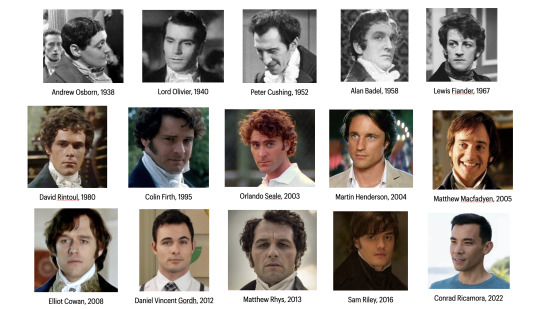
Every single Darcy ever.
1938, Andrew Osborn
1940, Lord Olivier
1952, Peter Cushing
1958, Alan Badel
1967, Lewis Fiander
1980, David Rintoul
1995, Colin Firth
2003, Orlando Seale (the one with the Mormons)
2004, Martin Henderson (Bride and Prejudice)
2005, Matthew MacFadyen
2008, Elliot Cowan (Lost in Austen)
2012, Daniel Vincent Gordh (The Lizzie Bennet Diaries)
2013, Matthew Rhys (Death comes to Pemberley)
2016, Sam Riley (Pride and Prejudice and Zombies)
2016, Chase Connor (Before the Fall, not featured as I wasn't able to find a decent picture)
2016 & 2018, Ryan Paevey (Unleashing Mr Darcy & Marrying Mr Darcy, not featured as I remembered these movies only after creating the infographic ops)
2022, Conrad Ricamora (Fire Island)
I'm not counting Bridget Jones since it doesn't market itself as having ties to P&P
#things i do in my free time#i'm kidding this was for school#believe it or not#pride and prejudice#jane austen#mr darcy#andrew osborn#lord olivier#peter cushing#alan badel#lewis fiander#david rintoul#colin firth#orlando seale#martin henderson#matthew macfadyen#eliot cowan#daniel vincent gordh#matthew rhys#sam riley#conrad ricamora#lost in austen#bride and prejudice#death comes to pemberley#pride and prejudice and zombies#the lizzie bennet diaries#fire island#chase connor#before the fall
60 notes
·
View notes
Text
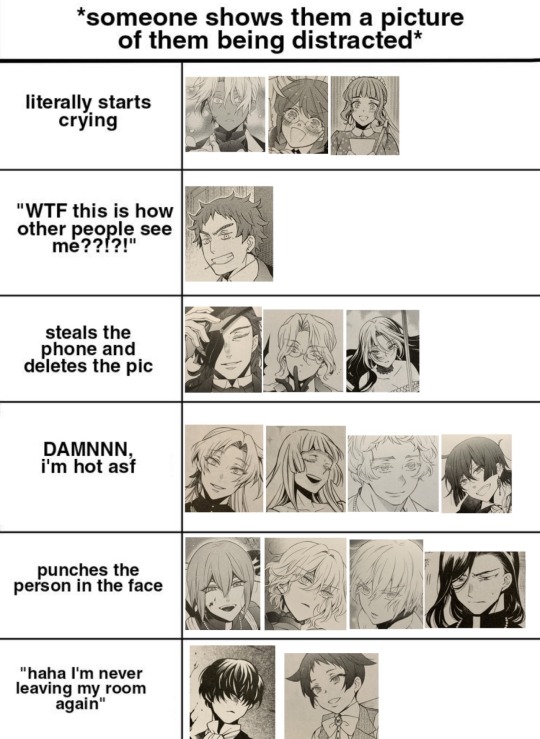
Dante all by himself
#the case study of vanitas#vanitas no carte#memoir of vanitas#by jun mochizuki#vanitas#noe archiviste#dominique de sade#jeanne the hellfire witch#luca oriflamme#lord ruthven#dante#riche#johann#olivier obsidian#roland fortis#astolfo granatum#jean jacques chastel#chloe d'apchier#veronica de sade#antoine de sade#amelia ruth
64 notes
·
View notes
Text

GRAY TEMPLES GRRRRR BARK BARK BARK RAGAHAHAHDJFNFNB
#david tennant#olivier awards#michael georgia and anna were so fine as well#oh lord have mercy#aging is quite possibly the hottest thing#aged like fine wine#good omens
28 notes
·
View notes
Text








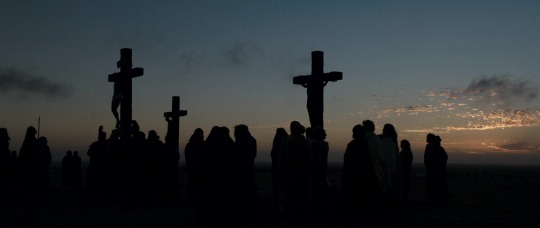
Good Omens x Masters of Death
#when I tell you as soon as I read the word ‘watching’ I knew I would be making this#don’t even get me started on my raphael x gabriel ideas#that’s coming next#or the parallels between mayra and crowley oh lord#aziracrow#good omens#quotes#web weaving#intertextuality#comparatives#knit#masters of death#olivie blake#mayra kaleka#archangel gabriel#the atlas six#good omens 2#crowly x aziraphale#anthony j crowley#aziraphale#jesus christ#literally
96 notes
·
View notes
Text
'Fleabag’s hot priest is about to take on his most liberating role yet: a one-man show of Chekhov’s Uncle Vanya in which he will play all nine roles, male and female. He loves taking risks, he says. It seems to be paying off…
I last saw Andrew Scott in the flesh eight years ago. I was sitting in the gloom at the top of what used to be St Martin’s School of Art in the Charing Cross Road – a tiny, temporary theatre had sprung up there – and he was three feet away from me, surrounded by great piles of stuff: newspapers, books, chairs, cupboards… a piano. The occasion was Richard Greenberg’s play The Dazzle, about two compulsive hoarders, the Collyer brothers, and his performance as one of them was mesmerising: in truth, almost too mesmerising. My mind went into overdrive. All that paper and mahogany. What if something toppled, and he was crushed – as the real Langley Collyer was – beneath a chest of drawers?
He wasn’t crushed, of course. But what’s striking and slightly odd is that today I’m seeing Scott in the flesh for the second time, and we’re again at the top of an old building – in this case, a public library – in rooms that feel a bit dilapidated, if not exactly derelict. People imagine the actor’s life to be a glamorous one, particularly if the actor in question has been in a Bond film – and of course it has its enchantments. But then there are the hours spent in spaces like this: long days of sandwiches, bottled water and elusive lines. When we came up in the ancient lift together, I couldn’t decide which of us was the more anxious. He was, I would guess. “MY TWELVE HOURS TRAPPED WITH FLEABAG STAR” ran the ticker tape in my mind as the mechanism creaked and groaned, and we each did our best not to meet the other’s eye.
Scott has spent the past three weeks here, deep in rehearsals for Vanya, a new version by Simon Stephens of Anton Chekhov’s great tragicomedy Uncle Vanya. But there’s new, and then there is… new. This adaptation gives the play, among other things, a contemporary setting. However, when the production opens in the West End, its chief novelty – and its chief draw, given Scott’s huge following – will be the fact that it is a one-man show. He will be playing all nine parts: male and female, young and old, beautiful and not-so-beautiful. It must be hard to learn so many lines, I say, once he’s (semi) comfortable on a battered leather sofa, his old, white T-shirt giving him a slight look of Marlon Brando. Doesn’t he feel like he’s going mad, with all these voices in his head? He laughs – a high-pitched, wicked laugh. “Yeah. I do, and it’s really hard [to learn]. Usually, when you can’t remember a line, another actor will say, ‘What time is it?’ or something, and then it comes to you. But now I’ve no one to cue me.” Alone on stage, he has had to change his mindset completely: “I’ve come to understand that I’m sort of looking after all these characters.”
The idea for a one-man production came about by accident. Scott, Stephens, and Sam Yates, who is directing the play, were workshopping it together (Scott has worked with Stephens twice before, most notably in Birdland at the Royal Court, in which he played a rock star who has made a Faustian pact with fame). “We miscalculated the parts, and I ended up having to act with myself, and it was kind of interesting. It gave birth to the idea that, as much as these characters say they’re different from each other, actually, some of them are very similar. I’m more interested now in those similarities than in, you know, doing a funny voice [for each one]. The production seems to me to be about what the act of creation is. I love the idea that you might be able to represent what a writer experiences on stage, all these characters in his head.”
But how on earth will the audience work out what’s going on? I understand about the funny voices, but won’t Scott have to change his a little bit when he’s acting the part of a woman? He smiles, teasingly. “I don’t think I should tell you that… But you don’t need to worry too much. I feel so liberated! I hope people will start to look at what’s within the performer so that something happens that can only really take place in a theatre – which is that you’re seeing one thing, but imagining something else.” This sounds like reading a novel, visualising scenes and characters for yourself, filling the gaps between words. He nods. “Look, I definitely don’t want to shy away from the ridiculousness of this project, and yeah, I’m nervous, but I’m loving the process. I think it’s a really sexy play. You know, Chekhov was a doctor, and he saw death so much, and I think he was able to understand human beings like no other writer.”
The argument that actors should only play who they are – that a gay character, for instance, may be played only by a gay actor – is made more and more often lately. But this production seems (to me, at least) subtly to resist the notion of identity politics in the theatre; to suggest that such rigidity may sometimes be a cul-de-sac. “It can be a cul-de-sac, certainly,” Scott says. “Of course those arguments have to be heard. The world isn’t a level playing field. But I think transformation is as important as representation. Our first understanding of storytelling happens when we’re young. Our mother or father is pretending to be a wolf. We know we’re safe, but we’re scared, too. Our parent can be a wolf! Human beings can create worlds within themselves. I don’t think we can just slice that out of ourselves.”
He knows some will heartily dislike this Vanya, but the thought seems, if anything, to excite him. “It could go wrong,” he says. “But we need a bit more of people not liking things.” He’s ambivalent, to put it mildly, about standing ovations, which seem to happen in the theatre most evenings nowadays. “My concern is that everything becomes meaningless. I think it’s unfortunate that if someone decides not to stand up, it’s perceived that they hated it. That’s not necessarily true. Maybe I thought it was very good, but I didn’t feel like rising to my feet. My producers are going to hate me for saying this, but I strongly believe that if people don’t feel like standing up, they shouldn’t. People feel lonely, having to stand when they don’t want to. Equally, it’s kind of moving when most people are not standing up, and three people are.”
Does he blame the internet for this? Is it just another form of “liking” something? “I do blame the internet, yes.” But perhaps, too, it has to do with cost. “I was recently on Broadway, and tickets there are astronomically expensive, and I thought: well, these people have to stand up because they’ve spent $390, so it’s got to have been one of the best nights of their lives.” Either way, he doesn’t understand it: the firmness and immediacy of people’s responses. “When you’ve just seen a play, it’s a really sensitive time. It’s weird when people start talking straight away about their new conservatory.” All this may explain why he feels there is more value for him in doing experimental work. “Some people will like it, some people won’t, and that’s great. I feel ferocious about wanting to take risks.”
In the coming months, Scott will be everywhere: a trick of scheduling, rather than by design. Vanya will be followed in January by the release of All of Us Strangers, a film in which he stars with Paul Mescal and Claire Foy (he plays a depressed screenwriter who goes to visit his childhood home, only to find that his parents, far from having died in a car crash when he was 12, are alive and well – though much of the coverage of the movie so far has focused on the fact that his character and Mescal’s are lovers). “It’s a beautiful film,” he says, dreamily. And then there’s Ripley, a Netflix series (its release is expected at the end of this year), based on Patricia Highsmith’s novel The Talented Mr Ripley, written and directed by Steven Zaillian, the screenwriter of Schindler’s List and Hannibal.
“It’s a big, big thing,” he says, of his role as Tom Ripley, grifter and serial killer. And yet, Scott said he wouldn’t be doing any more crazed sociopaths, having played Moriarty in Sherlock (he was also a baddie in the Bond film Spectre). “I know, but what I find interesting about him is not the psycho-ness; it’s the otherness. To me, it’s about what it’s like never to be invited to the party. We all know people who don’t make it easy for themselves, who are maybe a bit strange. But if you’re constantly ignored, or sidelined, or don’t fit in, what happens? Is it that something dark emerges? I don’t mind saying that playing him was challenging. It was very lonely. We filmed during Covid, and the five-day isolation requirements that were in place both here and in Italy meant people couldn’t come and visit, and I couldn’t come home. It’s eight hours of television, and he’s a solitary figure in this version, so I was on my own a lot.”
Scott is 46, though you wouldn’t know it; his enthusiasm, like his fidgetiness, belong to a younger man. He grew up in Dublin, with his two sisters – his father worked at an employment agency; his mother was an art teacher – where he was educated at private Jesuit school, attending drama classes on Saturdays. Art was his first plan – painting is still his great love; he can’t wait for the forthcoming Hockney show at the National Portrait Gallery – and he won a bursary to art school at 17. But then he was cast in a film, Korea, about an Irish boy emigrating to America in the 1950s who’s enlisted to fight in the Korean war, so he turned the place down, and once the movie was done, went to Trinity College to study drama instead. After six months, bored by the course, he left to join Dublin’s Abbey theatre.
He seems hardly ever to have been out of work, and his CV is such a mixture: Gethin the tense gay Welshman in Matthew Warchus’s film Pride; eccentric Lord Merlin in the BBC adaptation of The Pursuit of Love; an acclaimed Hamlet in 2017 at the Almeida theatre. By this point, his mantlepiece – he has two, one in London, and one in Dublin – must be quite frantic with statuettes (his most recent win, in 2020, was a Laurence Olivier award for best actor for his performance as Garry Essendine in Noël Coward’s Present Laughter). Does he feel blessed? “Yes, and that’s a really nice way of putting it. I’m grateful.” But perhaps this sounds too… humble: “I’ve never understood why there’s some sort of shame associated with being an artist. I feel able to call myself one.”
His fame is at a level that means he can move around London unnoticed, and he’d like to keep it that way. “I’m suspicious of it. I’ve no real interest in the value of it. The idea of being followed by a photographer seems hellish to me.” Does it affect his relationships? He doesn’t believe that it does, though there are “creepy, unsavoury people” out there who might not “have my best interests at heart”. Is he single? “Yes, I am.” Would he like to meet someone? He would. Surely it’s easy in his world? So many lovely new people entering his orbit all the time – and with his looks… He laughs. “That’s a lot of projection, there,” he says, sounding suddenly more Irish.
I read somewhere that some women in Ireland will always think of him as the guy who turned up to their demonstrations in the run-up to the abortion referendum in 2018, even when it was raining (the vote overturned the ban on abortion in the country, and followed one of 2015, which allowed same sex couples to marry). Isn’t it amazing how much Ireland has changed? When he was 16, it was still illegal to be gay, as he is. “Yes, it’s immense for people of my generation to have been emancipated from the shame of the Catholic church. But it’s interesting. Privacy matters to me, but then I remember Sinéad O’Connor being on The Late, Late Show, talking about human rights, and how important that was. Her kindness… We’re only just finding out about it. She didn’t announce it to the world. Again, it brings us back to social media. Does kindness happen if you don’t tell everybody about it?”
Scott is no longer a practising Catholic. But he can’t be certain this means he won’t call for the priest at the end (this conversation has taken a morbid turn, and it’s my fault). Perhaps it’s in the marrow. “It’s the organisation that’s the problem, not the principles behind it, which are very beautiful for the most part. I remember when Simon and I were doing [the play] Sea Wall. One of the lines in it is: show me God, where is he? And then the next line is: well, show me love, where is that? You can’t get evidence for either of them really. They’re just strong feelings. I believe in the power of love. I feel it’s stronger than anything, because you can’t do anything about it. I’ve so much of it in my life, and one of the things I’m most proud of is how much I’m able, not only to receive it, but to give it – and if somebody thinks that’s sentimental or mawkish, well, to me it’s the opposite.” He talks for a while in this vein. “I want to try to be a good person; not just a nice person, but a good person,” he says, his voice racing on – and it makes me think of him as the Hot Priest in Phoebe Waller-Bridge’s Fleabag, the role for which he may now be best known. If every pulpit came with an Andrew Scott, our churches would be bulging at the seams.
Soon after this, there’s a knock on the door. It’s time to begin rehearsal (in the hall outside, his director stands at a lectern, looking quite priestly himself). He has, he says, another three weeks to go before Vanya opens, and when it does, he’ll be looking out for me; I’d better be sitting down at the curtain call, he jokes. Well, perhaps I’ll have good reason to be sitting down, I joke back. But he’s ever serious: “I always remember what my mum used to say. She’s an art teacher, and she used to tell us that a good drawer never rubs out. So, you draw a line, and then you get it wrong, and then you start a new line. The fact that people can see your old line doesn’t make them appreciate your new line any less. It may even make them appreciate it more.” What he means, I think, is that he believes it’ll be all right on the night.'
#Andrew Scott#Fleabag#Vanya#Ripley#The Dazzle#Anton Chekhov#Uncle Vanya#Simon Stephens#Sam Yates#Birdland#All of Us Strangers#Paul Mescal#Claire Foy#Jamie Bell#The Talented Mr Ripley#Patricia Highsmith#Steven Zaillian#Moriarty#Sherlock#Spectre#Pride#Lord Merlin#The Pursuit of Love#Hamlet#Almeida Theatre#Noel Coward#Present Laughter#Olivier Awards#Sea Wall#Phoebe Waller-Bridge
18 notes
·
View notes
Note
I am so curious about Olivie, please how the hell is she playing “hard to get” with a DEAD HOUR and KISSING THE RENDING?! And apparently getting fun little powers from the sunflower king??? She sounds fabulous and I hope she ruins everyone’s day forever.
I have every confidence in her ability to do that.
Olivie is a very talented occultist, and has been the private student to two very experienced sorcerers.
The first she met when she was only fifteen: a Rending cultist in Arras who was preparing for the coming of the Plague. That cultist needed a creature in order to bring her plans to fruition, and Olivie was near to hand, and full of dazzling and reckless ambition. For three years Olivie learned from and aided that wicked agent, while the cultist transformed her own husband (the mayor of Arras) into an avatar of the Rending's power.
But the Rending liked Olivie even more than Its cultist did. And whatever passed between Olivie and that twisted, inhuman shape on the bed - whenever Olivie slipped past her mistress to let him whisper in her ear - certainly included 'a kiss.'
Bastian managed to kill the transformed mayor, and the cultist, but Olivie escaped. She went to join an old friend of her now-deceased mistress: a former acolyte of Lord Raymond the Cathar's, now an Ecdysiast cultist. The Ecdysiast has only slightly less rotten vibes than the Rending, so communion with him came naturally to Olivie. She has so far refrained from petitioning him, however: he means to overpower her, and she doesn't intend to let that happen.
She came relatively late to Sunflower King veneration, but it was a natural fit, along their shared axis of Grail. The Sunflower King has a real 'all shall love me and despair' energy that Olivie had no trouble locking into. Now in combat she can just randomly paralyze people with the horror of her greatness and beauty. It suits her.
In the last session, Bastian left Olivie behind with the young king of France for whom Bastian is prosecuting a civil war, and intends to betray for his crown. She'll have a year with him: and a year in proximity to Lord Raymond, and the Sunflower King calendar cultists under Philippe de la Marche. I'm sure she'll make something just wonderful out of this unexpected opportunity.
#heretic#Volo spent years snarling and barking at Olivie every time she walked by#convinced that she meant his lord ill#Bastian eventually had to pull him aside and tell him that basically even if Olivie IS planning to fuck them#she's earned her place#Volo admitted that he had been unchivalrous towards her and now treats her very attentively#dice matters
18 notes
·
View notes
Text




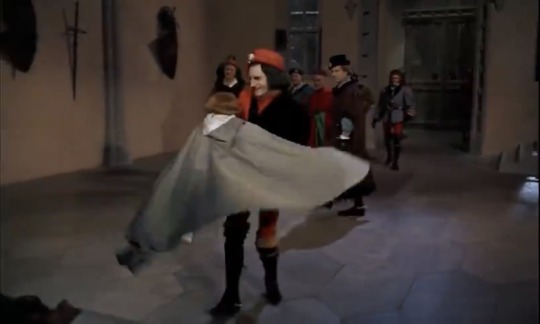


“Now, my lord, what shall we do if we perceive that the Lord Hastings will not yield to our complots?”
“Chop off his head, man”
Laurence Olivier as Richard III engaging in prime babygirl behaviors
#laurence olivier goes crazy in this role and for what#jesus christ…#if u see me babygirlifying richard iii no … yes … no you don’t#i never knew lord farquaad was modeled after him from this movie ahhhhh#shakespeare#richard iii#richard iii (1955)#laurence olivier#op
46 notes
·
View notes
Text
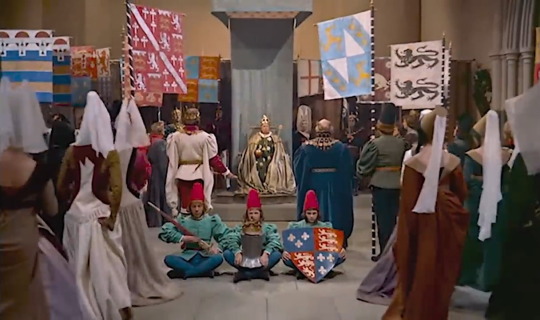

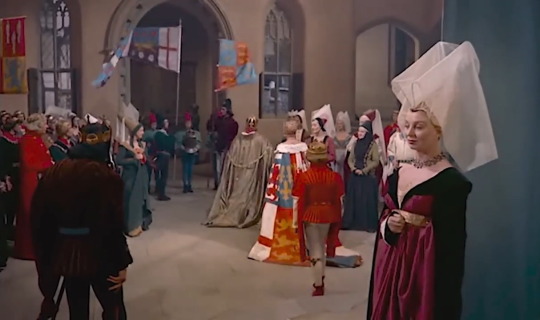
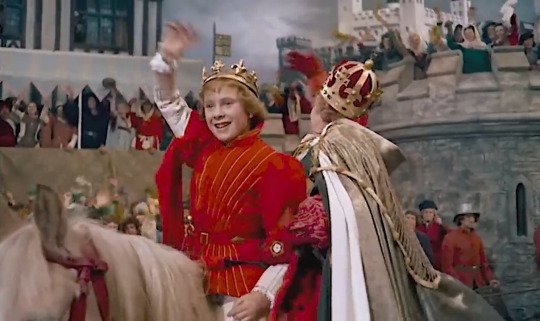
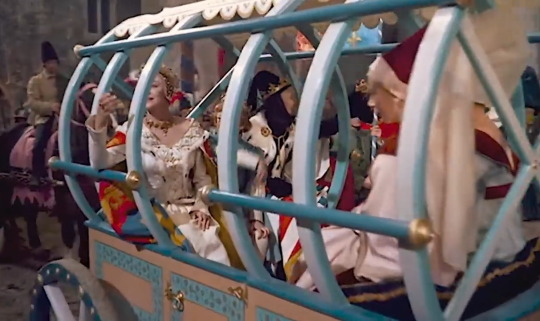
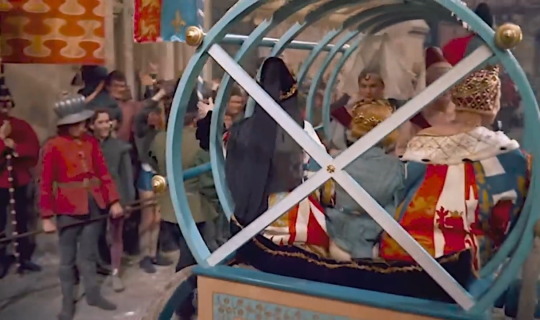
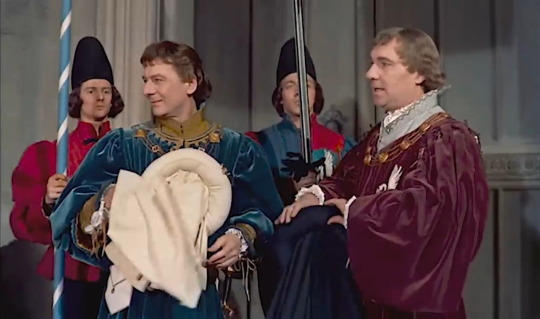
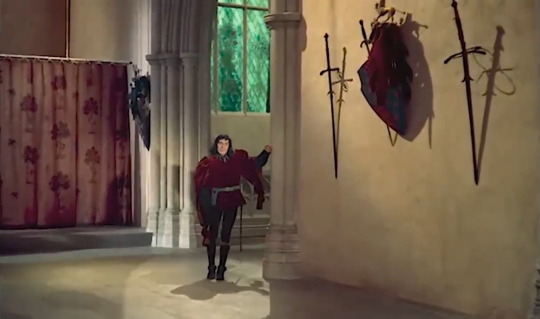
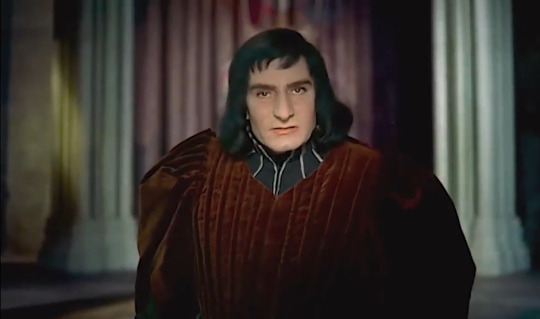

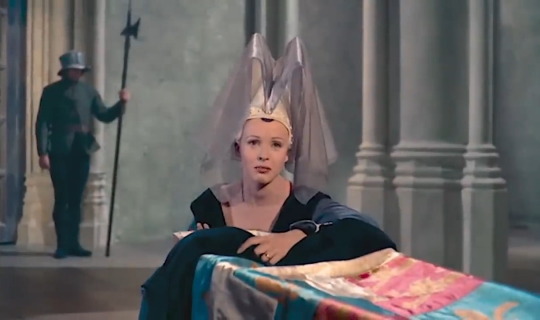


richard III, laurence olivier 1955
#richard iii#laurence olivier#william shakespeare#1955#claire bloom#mary kerridge#john gielgud#cedric hardwicke#ralph richardson#andy shine#the color of pomegranates#the lord of the rings#harry potter
7 notes
·
View notes
Text
hello lovely followers, today i offer you a quiz to find out your vnc spouse 🙏🏻
take it now and reblog with your results /threat 🔫🔫
#uquiz#vanitas no carte#vanitas#vanitas x reader#vanitas no shuki#les memoires de vanitas#the case study of vanitas#vanitas x you#vanitas imagines#vanitas headcanons#Dominique de sade#Jeanne#Noé Archiviste#roland fortis#Veronica de sade#olivier vnc#lord ruthven#Dante vnc#Johann vnc#The Teacher vnc#Vnc#vnc headcanons#vnc imagines#vnc noe#Vnc anime#Vnc manga#Vanitas manga#vnc vanitas#vanitas of the blue moon#new uquiz
122 notes
·
View notes
Text
youtube
Imagine Shaxx in place of Laurence Olivier, and you have how the whole Onslaught narrative is making me feel

Think of it as training, Guardian. You can only get stronger from this.
Also: The full 1944 Laurence Olivier movie is available for free on the YouTube channel Shakespeare Network - https://www.youtube.com/watch?v=5BLBQIwZ_h4
#destiny the game#destiny 2#into the light#lord shaxx#shaxx#absolutely loving Onslaught and the wider hold the line narrative#william shakespeare#shakespeare#Henry V#Laurence Olivier#Youtube
4 notes
·
View notes
Text

Pumpkin mood
#the case study of vanitas#vanitas no carte#memoir of vanitas#by jun mochizuki#vanitas#noe archiviste#jeanne the hellfire witch#dominique de sade#luca oriflamme#lord ruthven#dante#riche#johann#chloe d'apchier#jean jacques chastel#olivier obsidian#roland fortis#astolfo granatum#veronica de sade#antoine de sade#amelia ruth
69 notes
·
View notes
Note
Wonder what Michael thinks of David’s lewk for the Olivier Awards. hopefully they saw each other after the awards and Michael was able to appreciate his outfit more 😏
Well, we all know Michael is the king (queen?) of gay once-overs, so I imagine he would've looked at David like this:

Although...I'm fairly certain in this case it wouldn't have been a "once" over, but a many, many times over, looking David up and down as wantonly as possible.
I don't think Michael was in London yesterday, sadly, so I'm not so sure about them getting to see each other after (at least in person). But we do know that Michael was in London for that BAFTA Cymru event in February, so I love the thought of David and Michael going suit shopping at the JK boutique together.
It's so easy to picture David excitedly grabbing several of the Dandy Rebels suits and changing into them to show Michael, and Michael being very appreciative of how those suits look on him. And maybe David was a bit reluctant to make such an extravagant purchase at first, to spend that kind of money on himself, until Michael reassured him:
"You look absolutely gorgeous in that, Dai. You deserve it. Go on, treat yourself."
And David was only going to buy one suit (perhaps the red & black?) but Michael insisted on buying him a second one (the gold).
"Oh, it's--it's too much. No, I can't let you do that," David says abashedly, trying and failing to hide how pleased he is at the way it looks on him.
"I'll do anything I like, sweetheart. Within reason, of course," Michael winks, fisting the fabric of the gold jacquard waistcoat and pushing David backward into the opulent dressing room. He slides his tongue into David's mouth in a heated kiss, the door closing behind them as David moans and the discreet store clerks carry on with their business...
Oh, yes...I could see that very, very clearly. And if that were the case, just imagine Michael seeing David in that beautiful suit the night of the Oliviers (even on Facetime), having that memory. Delicious.
Whatever the case may be, I have no doubt Michael wholeheartedly appreciated that outfit on David. Truly hoping we'll have the chance to see some of that appreciation in person when the GO 2 press tour gets underway. Fingers crossed...
#anonymous#reply post#michael sheen#welsh seduction machine#david tennant#soft scottish hipster gigolo#olivier awards#fanfic ideas a brewin'#no really this is a snippet of an MS/DT fic idea i have involving David in that waistcoat#lord help me like i don't already have things to do#they are both going to kill me#bless#good omens rpf#freestyle smut#ineffable lovers#discourse
15 notes
·
View notes
Text
Another one!
Adding another of my work process clips. This time of some old guy that got a ring from Tiffany's, even though he couldn't afford it. He's gonna need to do some overtime!
*edited in Youcut*
#olivier_demers #OlivierDemers #art #artprocess #art_process #artistoninstagram #characterconcept #fantasyart #artvideo #art_video #tutorial #gandalf #sauron #nazgul #lordoftherings #lord_of_the_rings
#lotr #ring #sol_ring #1/1_ring #magicthegathering #wizard #when_she_ask_for_a_ring
#olivier demers#art#concept art#drawing#lord of the rings#gollum#gandalf#sauron#the one ring#magic the gathering
2 notes
·
View notes
Text
olivier: sees giblets at that meeting at the redoubt camp
olivier, ignoring everyone else: who’s a good boy! you are! yes, you are!! :D
#lord olivier ''i'm only doing this for the doggo'' durant#elder scrolls online#eso#daggerfall covenant#olivier durant
2 notes
·
View notes
Text
Lord have mercy.
What a whore, though. I mean him and me both at this point.


I need to step away from this situation/ my phone or the entirety of Tumblr is going to see what a massive slut I am.
#olivier giroud#lord have mercy#he did this for me#he didnt have to#french football#football daddy#ac milan
2 notes
·
View notes
